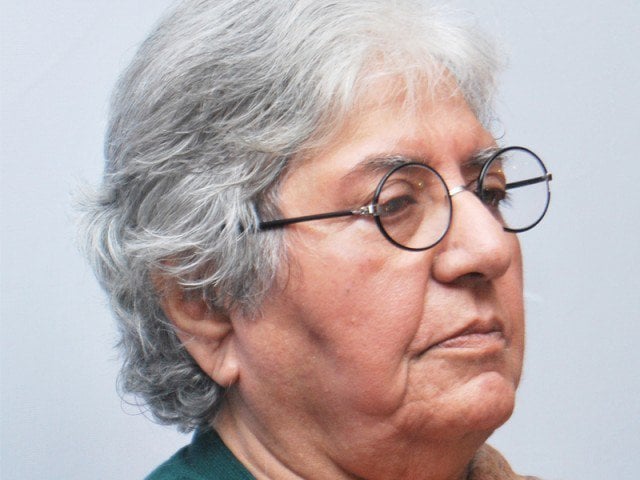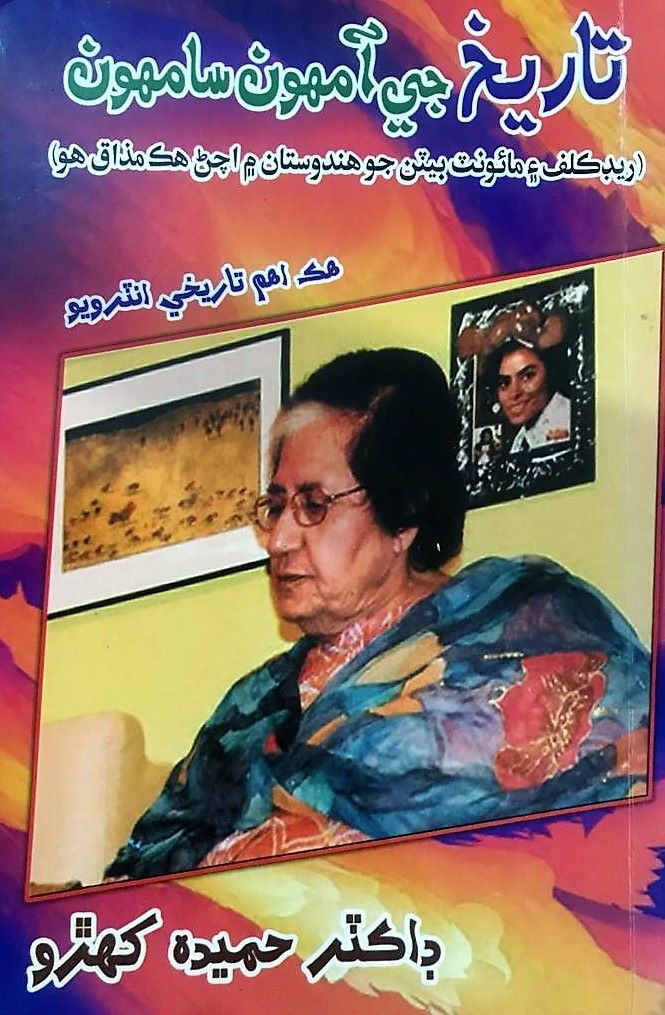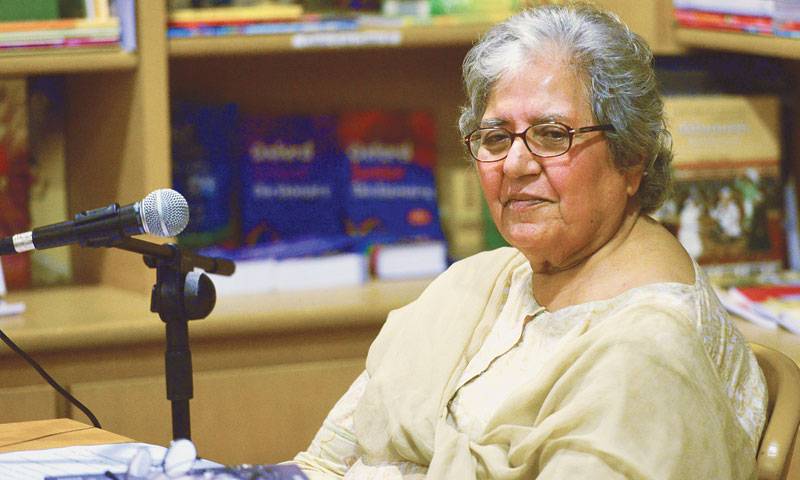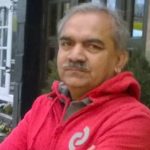
[Translator’s note: This is a translation of renowned historian Dr. Hamida Khuhro’s comprehensive interview, originally published in the Sindhi magazine Nao Niapo, Karachi in May, 1986. The interview panel consisted of Advocate Masood Noorani, Journalist Nasir Aijaz and Faqir Muhammad Lashari, with Mansoor Qadir Junjo’s assistance to the interviewers. Masood Noonari also contributed observation notes from his initial meeting with Dr. Khuhro, which were used as a preamble to the interview. The interview was later included in an anthology that contained interviews of Dr. Khuhro, published in various Sindhi newspapers and magazines.
In 2021, Dr. Hamida Khuhro Foundation, Sindh (Karachi-Hyderabad) published Nao Napo magazine’s interview as a separate booklet with a title of ‘Tarekh Ji Amhon Samhon’ (Face-to-Face with History). The booklet includes a preface by Mansoor Qadir Junejo. This is the first part of the English translation of her interview. The subsequent parts will also be published in Sindh Courier – Zaffar Junejo]
During my first encounter with Dr. Hamida Khuhro on October 31st, 1984, I perceived her as a simple woman. On October 29th, I received a phone call from her husband, Dr. Haleem Qazi, inviting me to attend a meeting at Khuhro House in Karachi. The purpose of the meeting was to discuss the tragic incident at Thori Phattak. I traveled from Hyderabad and arrived in Karachi on October 31st. When I took a taxi to the meeting place, the Pathan driver unexpectedly shared the news that ‘Indira Gandhi had been assassinated by her Sikh bodyguard’. I was taken aback by this shocking news, considering it a devastating moment in the history of the subcontinent. The taxi driver continued his ‘tale’ with enthusiasm, remarking that ‘one of Pakistan’s powerful opponents is no more.’ As his monologue left me frustrated, I pondered at the possibility of flaws in ideologies of Khan Abdul Ghaffar Khan and G.M. Syed, and that why till now these groups haven’t liberated themselves from exploitation and suppression. Amidst my dismay, I arrived at Khuhro House. Dr. Haleem Qazi warmly greeted me and introduced to Dr. Hamida Khuhro, who was seated in a row of chairs. Adjacent to her chair was Hussain Haroon, elegantly smoking a cigar and releasing gentle puffs into the air. I approached Dr. Hamida Khuhro, introduced myself, and received a positive response. Taking a seat among a gathering of Pirs, Syeds, Zamindars, and Raees, I couldn’t help but reflect on the role these classes had played in enslaving Sindh and questioned their ability to address the Thori Phatak issue. Moreover, in a country burdened by a repressive Martial Law, I wondered about the simplicity of Dr. Hamida Khuhro.

Once again, I observed Dr. Hamida Khuhro closely. She was dressed in a simple lawn outfit, wearing ordinary sandals and no makeup. She looked like Qalandaryani. It was the first time I had encountered a woman from a landed family who appeared without any makeup. This reminded me of Begum Ra’ana Liaquat Ali Khan, who, despite being a grandmother, always wore a thick layer of makeup. As I surveyed the surrounding, I saw Muhammad Ibrahim Joyo and Siraj Memon entering the hall. Their presence gave me confidence and made me realize that I was not alone. Glancing around the hall, I noticed that it was almost filled to capacity with a diverse range of classes and professionals – journalists, lawyers, doctors, engineers, student leaders, intellectuals, landlords, and individuals engaged in small businesses. This mixed gathering made me appreciate Dr. Hamida Khuhro’s intelligence, and acknowledged that she has successfully united various sections of society to condemn the government.
Suddenly, Dr. Hamida Khuhro turned to Hussain Haroon and asked in English, ‘What do you think? Should we start now?’ Without waiting for a reply, she stood up and showed herself to be a woman of her own mind and determination. I realized that her address to Hussain Haroon was merely symbolic – I took it as she asked herself for the permission and then granted herself to proceed.
Unbeknown to me, she pulled a chair and stood beside me while someone set up a tape recorder to record her speech. She spoke in English with a confident and flowing voice that surprised me. It was not the voice of an ordinary woman. It felt as if the power key of an old gramophone had been slowed, and Jiwani Bai’s voice had transformed into the thick voice of C.H. Atma.
Dr. Hamida Khuhro’s speech gained momentum as she passionately discussed the atrocities like that of the Thori Phatak incident. The audience was captivated by her words. Her confidence and delivery style complemented each other. Everything she spoke was a testament to her patriotism and her deep connection to Sindh and Sindhis, dating back to the time before the ancient city of Mohen Jo Daro. She fearlessly exposed the cruelties of the Martial Law and criticized the regime. Her bold speech encouraged all of us, and I even found myself speaking up on two occasions. Soon, thoughts of feudal lords, Pirs, and Khuhro House faded from my mind.
The bold speech by Dr. Hamida Khuhro encouraged others to speak out as well, exposing and criticizing the military regime. It was evident that her speech had motivated others in the meeting. Even the cool minded, Ali Ahmed Brohi could not contain his anger and cursed the regime. It became clear to me that she had skillfully united all sections of Sindhi society against the regime. She was undoubtedly a strategist, an administrator, and an experienced individual who knew how to maneuver situations according to her own ideas and actions.
When I returned home, I opened my diary and added Dr. Hamida Khuhro’s name to the list of individuals I intended to interview.
 The interview was unexpectedly delayed, but I finally mustered the courage to call Dr. Hamida Khuhro and set a date for the interview. In my assumption, she would likely try to postpone or make excuses. However, to my surprise, she instantly agreed and said, ‘Fine, I agree.’ I consulted with Nasir Aijaz and Faqir Muhammad Lashari, and we fixed May 4th, 1986, as the interview date. We also agreed that we all will assemble at Karachi Press Club. Afterwards, I informed Dr. Hamida Khuhro about our plan and mentioned that the interview might take two to three hours, possibly disrupting her scheduled day. I also expressed concern that it might coincide with her rest or lunch time, and suggested that we could adjust our plan, if it is inconvenient. In response, she warmly reassured us, stating that it was perfectly fine and even invited us to have lunch with her. She jokingly remarked that she was not socially rude enough to decline lunch with three to four people. On the morning of May 4th, I arrived in Karachi from Hyderabad slightly earlier than planned. This was due to a political gathering of Benazir Bhutto on May 3rd, and I anticipated potential traffic jams or transport issues that could delay my arrival. I gathered all the necessary equipment and recording tools for the interview. As agreed upon, I reached the Karachi Press Club at 11:00 a.m. However, upon arrival, I discovered that only Nasir Aijaz was present, while Faqir Muhammad Lashari and Saeed, the photographer, were absent. I learned that Faqir Muhammad had gotten caught up in a last-minute meeting. Determined to ensure his participation, I promptly contacted him via telephone and expressed my frustration. My words seemed to have had an effect, as he realized the urgency and importance of our agreed-upon activity. He assured me that he would join the team at Dr. Hamida Khuhro’s house. Fortunately, I also noticed the presence of Saeed the photographer. This situation made me reflect on the fact that when someone is determined, circumstances tend to align in their favor to carry out their plans. (To be continued)
The interview was unexpectedly delayed, but I finally mustered the courage to call Dr. Hamida Khuhro and set a date for the interview. In my assumption, she would likely try to postpone or make excuses. However, to my surprise, she instantly agreed and said, ‘Fine, I agree.’ I consulted with Nasir Aijaz and Faqir Muhammad Lashari, and we fixed May 4th, 1986, as the interview date. We also agreed that we all will assemble at Karachi Press Club. Afterwards, I informed Dr. Hamida Khuhro about our plan and mentioned that the interview might take two to three hours, possibly disrupting her scheduled day. I also expressed concern that it might coincide with her rest or lunch time, and suggested that we could adjust our plan, if it is inconvenient. In response, she warmly reassured us, stating that it was perfectly fine and even invited us to have lunch with her. She jokingly remarked that she was not socially rude enough to decline lunch with three to four people. On the morning of May 4th, I arrived in Karachi from Hyderabad slightly earlier than planned. This was due to a political gathering of Benazir Bhutto on May 3rd, and I anticipated potential traffic jams or transport issues that could delay my arrival. I gathered all the necessary equipment and recording tools for the interview. As agreed upon, I reached the Karachi Press Club at 11:00 a.m. However, upon arrival, I discovered that only Nasir Aijaz was present, while Faqir Muhammad Lashari and Saeed, the photographer, were absent. I learned that Faqir Muhammad had gotten caught up in a last-minute meeting. Determined to ensure his participation, I promptly contacted him via telephone and expressed my frustration. My words seemed to have had an effect, as he realized the urgency and importance of our agreed-upon activity. He assured me that he would join the team at Dr. Hamida Khuhro’s house. Fortunately, I also noticed the presence of Saeed the photographer. This situation made me reflect on the fact that when someone is determined, circumstances tend to align in their favor to carry out their plans. (To be continued)
________________
 Dr. Zaffar Junejo is a historian and a writer, having earned Doctorate from the Department of History University of Malaya, Malaysia. Presently, Mr. Junejo is associated with the European University Institute, Florence, Italy. Apart from scholarly contribution, he also writes for popular media. He could be accessed at: Email junejozi@gmail.com, Cell/WhatsApp +92 334 045 5333 Skype Zaffar.Junejo Facebook facebook.com/zaffar.junejo
Dr. Zaffar Junejo is a historian and a writer, having earned Doctorate from the Department of History University of Malaya, Malaysia. Presently, Mr. Junejo is associated with the European University Institute, Florence, Italy. Apart from scholarly contribution, he also writes for popular media. He could be accessed at: Email junejozi@gmail.com, Cell/WhatsApp +92 334 045 5333 Skype Zaffar.Junejo Facebook facebook.com/zaffar.junejo
[…] here for Part-I and Part-II (Preamble) – Part-!II , Part-IV , Part-V , […]
[…] here for Part-I and Part-II (Preamble) – Part-!II , Part-IV , Part-V , Part-VI , […]
[…] here for Part-I and Part-II (Preamble) – Part-!II , Part-IV , Part-V , Part-VI , Part-VII , […]
[…] here for Part-I and Part-II (Preamble) […]
[…] here for Part-I and Part-II (Preamble) […]
[…] here for Part-I and Part-II (Preamble) […]
[…] here for Part-I and Part-II (Preamble) […]
[…] here for Part-I and Part-II (Preamble) […]